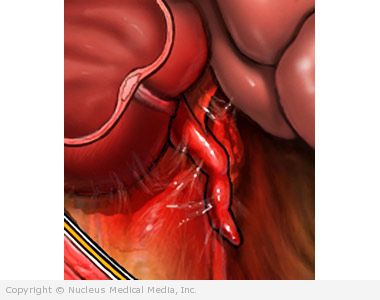Appendectomy – laparoscopic surgery
Appendectomy – laparoscopic surgery – Definition
An appendectomy is the removal of the appendix. The appendix is a small, blind-ended tube that is attached to the large intestine.
Appendectomy – laparoscopic surgery – Reasons for Procedure
An appendectomy is most often done as an emergency operation to treat appendicitis. Appendicitis is inflammation of the appendix. It can be caused by an infection or obstruction.
Appendectomy – laparoscopic surgery – Possible Complications
Complications are rare, but no procedure is completely free of risk. If you are planning to have an appendectomy, your doctor will review a list of possible complications, which may include:
- Bleeding
- Infection
- Damage to other organs
- Reaction to anesthesia
Some risk factors that make complications more likely include:
- Smoking
- Appendix has ruptured
- Age: 65 or older
- Obesity
- Diabetes
- Chronic lung or heart disease
- Pregnancy
Appendectomy – laparoscopic surgery – What to Expect
Prior to Procedure
Your doctor may do the following:
- Physical exam
- Blood and urine tests
- X-rays —a test that uses radiation to take a picture of the inside of the body
- Ultrasound —a test that uses sound waves to find the appendix and other organs
- CT scan —a type of x-ray that uses a computer to make pictures of the inside of the body
Antibiotics will be started right away. Since appendicitis is an emergency condition, surgery is almost always done right away.
Appendectomy – laparoscopic surgery – Anesthesia
General anesthesia will be used. You will be asleep, with a temporary breathing tube in place.
Appendectomy – laparoscopic surgery – Description of the Procedure
Three small incisions will be made in your abdomen. A laparoscope (small tool with a camera on the end) will be passed through an incision. Gas will be blown into your abdomen to make it easier for the doctor to see. Other tools will be inserted into the incisions. The camera will send images of your insides to a video screen. The doctor will use these images to find and remove the appendix.
The appendix will be detached from surrounding tissue. The doctor will stop any bleeding from blood vessels. The appendix will then be tied off and cut out. A stapler will be used to cut the appendix out. The incisions will be closed with stitches or staples.
Appendectomy – laparoscopic surgery – After Procedure
The removed tissue is examined by a pathologist.
Appendectomy – laparoscopic surgery – How Long Will It Take?
1-2 hours
Appendectomy – laparoscopic surgery – How Much Will It Hurt?
Anesthesia prevents pain during surgery. You may be given medicine to manage any pain.
Appendectomy – laparoscopic surgery – Average Hospital Stay
You may go home on the same day, as long as there are no complications.
Appendectomy – laparoscopic surgery – Post-procedure Care
At the Hospital
You will be asked to get out of bed about six hours after surgery.
At Home
Recovery takes about 1-2 weeks.
When you return home, do the following to help ensure a smooth recovery:
- You may resume your normal preoperative diet as soon as possible.
- You may be given antibiotics to fight infection. Take all the medicines your doctor gives you, even if you start to feel better.
- Keep the incision area clean and dry.
- Ask your doctor about when it is safe to shower, bathe, or soak in water.
- Wash your hands before changing the dressing.
- Rest, and take it easy for 1-2 weeks.
- Do not exercise or do heavy lifting for one or more weeks as directed by your doctor.
- Gradually increase activities as approved by your doctor.
- Be sure to follow your doctor’s instructions.
Appendectomy – laparoscopic surgery – Call Your Doctor
After you leave the hospital, contact your doctor if any of the following occurs:
- Signs of infection, including fever and chills
- Redness, swelling, increasing pain, excessive bleeding, or discharge at the incision sites
- Cough, shortness of breath, chest pain, or severe nausea or vomiting
- Increased abdominal pain
- Fainting or dizziness
- Passing blood in the stool
In case of an emergency, call for medical help right away.

